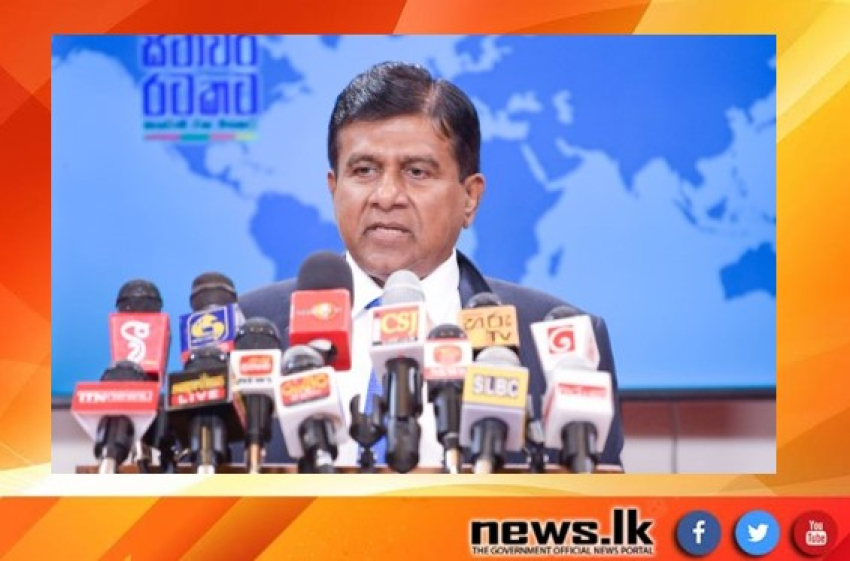Minister of Justice, Prisons Affairs and Constitutional Reforms Dr. Wijeyadasa Rajapakshe, the Chairman of the Parliamentary Special Committee tasked with Providing Recommendations for the Expansion of Higher Education Opportunities in Sri Lanka, emphasized the pressing necessity of formulating a national government policy to enhance the quality of education in Sri Lanka.
Furthermore, the minister underscored the challenge of nurturing the human potential of children in the absence of a competitive education system. Minister Wijeyadasa Rajapakshe conveyed these sentiments during his participation in a press conference held at the Presidential Media Centre(12), under the theme ‘Collective Path to a stable country.’
He also highlighted the current demand for vocational training in the country and advocated that institutions offering such education should receive recognition on par with universities.
Addressing the media briefing Dr. Wijeyadasa Rajapakshe further said;
In our country, we boast a high standard of education. However, the opportunities available for our students to access the highest levels of education are insufficient. In today’s competitive environment, our children are often taught to memorize knowledge rather than fostering skills, knowledge and intelligence development.
The beginning of the five-year scholarship program introduces fierce competition among children, which sometimes leads to negative emotions like hatred and anger. Despite achieving high exam scores, we have observed little improvement in the development of their character and human qualities. This competitive atmosphere extends to both the General and Advanced Level exams. As long as this competitive education system persists, it remains challenging to nurture an altruistic community for our nation.
Comparing our education system with that of developed countries reveals a key difference. They have a General Term examination system without a scoring mechanism. Every child passes and special attention is given to those with weaknesses, ensuring a well-rounded education. Finland, known for its exemplary education, once had a system similar to ours in the 1970s.
For children to grasp intelligence effectively, they must have a relaxed mind-set. Even without tutoring classes, students in these countries perform well academically. However, in our context, the pressure of competition often results in mental stress among the majority of university-bound children.
In light of these challenges, we propose that the emphasis given to universities should also extend to early childhood development. While teaching older students presents its challenges, ensuring a strong foundation during early childhood is paramount.
Our higher education system currently lacks organization. With 16 state universities governed by the University Grants Commission, there exists some independence, but it’s vital to align the necessary provisions for these institutions. Despite extending free education to the private sector, we have yet to establish a comprehensive system for its oversight.
Moreover, foreign universities and affiliated institutions operate without a standardized quality assurance system. Additionally, vocational training institutes, despite being vital for the country’s needs, lack the recognition accorded to universities. It’s crucial to grant proper recognition and support to vocational training education to meet the demands of our nation effectively.
In this situation, I find it disheartening to witness the youth community of our country discouraged from pursuing vocational education. In contrast, vocational training in other countries often leads to the attainment of degrees. This is why I strongly suggest a comprehensive overhaul of our country’s education system.
The University Grants Commission, which was established in 1978, was modelled after the Indian system. However, India has since progressed significantly, moving away from this education model. They now have an Independent Higher Education Commission, which registers universities based on rigorous standards, irrespective of whether they are government-funded or private.
The inability to establish a high standard for higher education within our country has led some students to seek education abroad. Furthermore, the practice of leaving students idle for months after exams until results are released is a serious concern. We must reform this educational system, which wastes valuable time.
In light of these challenges, our proposal suggests the creation of a Higher Education Commission to replace both the University Grants Commission and the Vocational Training Authority. Under this Higher Education Commission, there would be three units: public universities, private universities and professional universities, each with its own standards protected by a separate unit.
It is essential, in line with the country’s policy that degrees are awarded without discrimination between subjects or differences in the standards set by each university. All degrees should meet a single standard.
Our aim is to eradicate the perception of education being a commodity or lacking in quality. We have put forth numerous suggestions to prevent the recurrence of issues in educational institutions. Additionally, we propose shifting the general level examination to the 10th grade and the advanced level examination to the 12th grade.
As a committee, we have undertaken a thorough research process, gathering insights from various stakeholders, including academics, to compile a comprehensive report.
We firmly believe that a broad discussion is necessary to address the existing free education system in our country. We propose the development of a national government policy in collaboration with the people, one that would be enshrined in an Act of Parliament and remain consistent across different administrations.
While some may seek political advantage in altering the education reform system, it ultimately falls upon the people of our nation to decide the fate of our children’s education. We stand ready to guide the transformation of our education system, but it is imperative that the government addresses the organizations that disrupt higher education in our country.



















